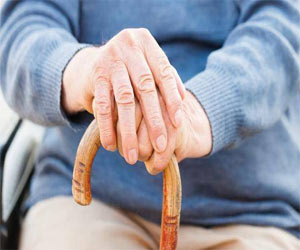- Home
- Editorial
- News
- Practice Guidelines
- Anesthesiology Guidelines
- Cancer Guidelines
- Cardiac Sciences Guidelines
- Critical Care Guidelines
- Dentistry Guidelines
- Dermatology Guidelines
- Diabetes and Endo Guidelines
- Diagnostics Guidelines
- ENT Guidelines
- Featured Practice Guidelines
- Gastroenterology Guidelines
- Geriatrics Guidelines
- Medicine Guidelines
- Nephrology Guidelines
- Neurosciences Guidelines
- Obs and Gynae Guidelines
- Ophthalmology Guidelines
- Orthopaedics Guidelines
- Paediatrics Guidelines
- Psychiatry Guidelines
- Pulmonology Guidelines
- Radiology Guidelines
- Surgery Guidelines
- Urology Guidelines
Frailty: New screening tool for assessing fitness for operation

It may be linked to more complications after an operation among adults of all ages, according to a new study published in the Journal of the American College of Surgeons.
Frailty is a decline in resistance and function to short-term stress that occurs typically in old age. A brief measure of frailty can help in the determination of a patient's fitness for a nonurgent operation, suggest the researchers.
Claire L. Isbell, a general surgeon at Baylor Scott & White Memorial Hospital in Temple, Tex., and colleagues hypothesized that frailty impacts postoperative outcomes in a large health care system.
For the study, the researchers prospectively measured frailty in elective surgery patients in a health care system. They used the Modified Johns Hopkins Frailty score to measure frailty preoperatively. This short tool measures four components: unintentional recent weight loss of 10 pounds or more, weak handgrip, low blood level of hemoglobin, and a higher American Society of Anesthesiologists score, a measure of physical status that helps predict anesthesia risk. One point is assigned for each component, and if both weight loss and weak grip are present, another point is added, so that the patient’s frailty score is a maximum of 5. According to the researchers, a score of zero defines low frailty, 1 or 2 defines intermediate frailty, and 3 to 5 defines high frailty.
14,530 patients (68.1% outpatient, 31.9% inpatient) were preoperatively assessed in elective surgical cases (cardiothoracic 4%, colorectal 4%, general 29%, oral maxillofacial 2%, otolaryngology 8%, plastic surgery 13%, podiatry 6%, surgical oncology 5%, transplant 3%, urology 24%, vascular 2%). More than half of the patient population studied (53.9 percent) was under age 60.
Among 14,530 adults undergoing various elective operations in a single health care system, those who demonstrated three or more frailty criteria were significantly more likely in the first postoperative month to experience worse results compared with patients without frailty criteria. Specifically, more frail patients had higher rates of major illness or complications, discharge from the hospital to a rehabilitation facility, readmission to the hospital, or death, researchers reported.
Key Findings:
- Among all patients, 3.4 percent had high frailty: 5.3 percent of inpatients and 2.5 percent of outpatients.
- Most patients reportedly measured as obese or overweight. Cancer was a common diagnosis in those with increased frailty.
- Compared with low frailty, the presence of high frailty correlated with significantly worse outcomes within 30 days of the operation including:
- Increased risk of experiencing a major complication (a composite of multiple serious complications): 2.9 and 1.8 times greater odds in the outpatient and inpatient groups, respectively
- Longer median hospital stay, by 2.5 days; higher health care costs; and a 5.6 times greater chance of being discharged to a nursing facility for the inpatient group
- Greater chance of being readmitted to the hospital: 4.8 times the odds for outpatients and 2.3 times the odds for inpatients
- More than twice the odds of an emergency room visit after an outpatient procedure
- Even intermediate, or moderate, frailty significantly increased the risk of all these outcomes.
“Frailty is identified as an important risk factor affecting surgical outcomes in elderly patients and more recently also in younger patients, even people as young as 40,” said Isbell. “With the national obesity epidemic, comorbidities [co-occurring illnesses] typically seen later in life are increasingly prevalent in younger people."
This study is the first to determine the impact of frailty on postoperative outcomes in multiple surgical subspecialties across a large health care system for both inpatient and outpatient procedures, said coinvestigator Harry T. Papaconstantinou, MD, FACS, chairman of the department of surgery at Baylor Scott & White Memorial Hospital.
If patients scheduled for a major or complex operation find out they have a high level of frailty, an option might be a “prehabilitation” program, Dr. Isbell suggested. A preoperative rehabilitation program, such as the American College of Surgeons Strong for Surgery, encourages patients to make physical and lifestyle changes aimed at improving the body’s ability to withstand the stress of undergoing an operation.
“We think patients should discuss their frailty risk with their surgeon and the ways they can improve their health before their operation,” Dr. Papaconstantinou said. “You would train for a marathon. Similarly, you have to get ready for an operation so you have the least possible risk of negative outcomes.”
For further reference log on to https://doi.org/10.1016/j.jamcollsurg.2018.12.036

Disclaimer: This site is primarily intended for healthcare professionals. Any content/information on this website does not replace the advice of medical and/or health professionals and should not be construed as medical/diagnostic advice/endorsement or prescription. Use of this site is subject to our terms of use, privacy policy, advertisement policy. © 2020 Minerva Medical Treatment Pvt Ltd